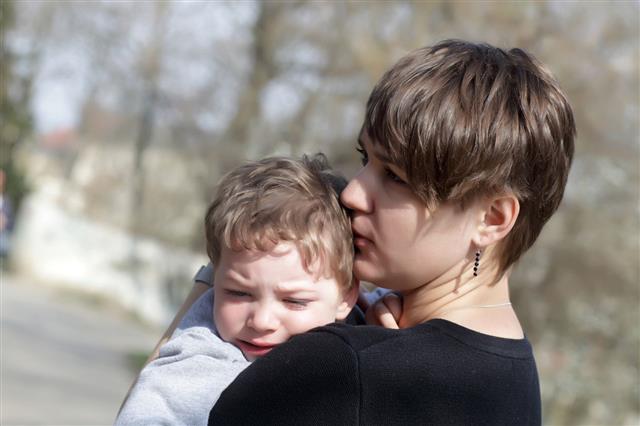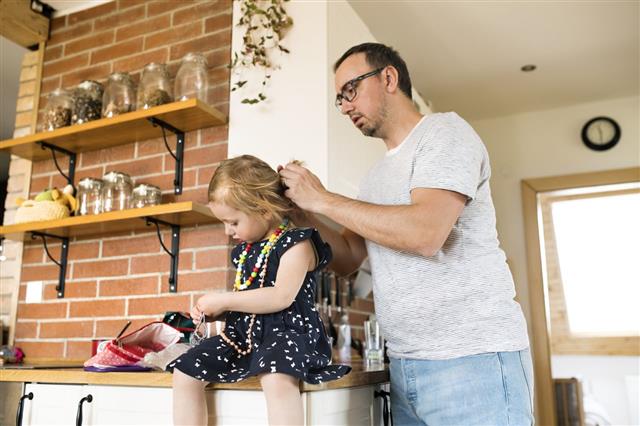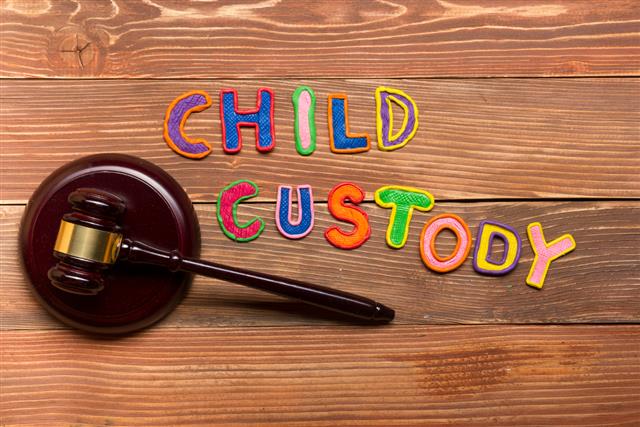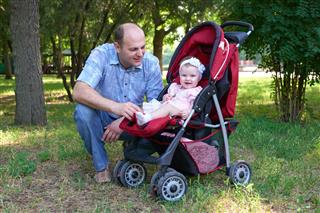
You have just been part of a bitter divorce or separation and there is nothing more tempting than the offer of a secluded corner where you could privately lick your wounds. But instead, you have to gear yourself up for a child custody hearing.
If you are preparing yourself for a child custody hearing (generally contested because a couple could not come to a mutual, out-of-court agreement), you are mostly aware of the impact that the outcome will have on you and your child. You are probably scared, angry, embittered, depressed or on the verge of a nervous breakdown with all the worry over the verdict a judge will give. The first important thing for you to do, before you learn to prepare yourself for a child custody hearing, is to calm yourself. Nothing worthwhile can be achieved when you are in a heightened emotional state. You have held yourself together so far, hang on for a little longer and set aside your emotional outburst for a time after the custody hearing.
Once you have rid yourself of personal baggage, put your logical and rational mind to work. Think about your child with a clear and unclouded mindset. What would be in the best interest of your child? It is easy to get carried away by feelings and come to the conclusion that because your spouse failed to be a good partner, he/she would fail to be a good parent. As far as possible, look at the situation from your child’s point of view. Then, based on what you think is best for your child.
Things to Know Before a Hearing
As any experienced single parent would know, to win a custody battle is no less than winning an actual battle and just like a general has to have a strategy in place, a personalized ‘child custody strategy’ is a must. The worst thing that can happen in a child custody is overlooking a deserving parent as an unfit parent. More often than not, the reason for this lies in poor planning of the better parent. To avoid this from happening to you, here are a few things you must know.
- The judge, or any other person in the court, does not know you. They might know about you based on the case file, but not who you really are.
- Your advocate is a representative, not a projection of you. Trust him/her but don’t leave everything to him/her.
- Courts no longer grant custody to a mother automatically. They decide the custody rights based on what is in the best interest of the child.
- Study your state laws on child custody thoroughly.
- Research on previous cases similar to yours.
Preparation for a Hearing
Self-evaluation
Honesty is indeed the best policy in a child custody hearing. As it is, your opponent in court is going to put you through a microscope. Instead of waiting for an outsider to reopen your wounds or use your weak spots as ammunition, you might as well do it yourself. While doing this, don’t limit your evaluation to just the parenting skills. The judge is going to focus on your parenting skills and see you as an individual. Ask yourself these questions:
- What traits in my personality are commendable?
- Which of my personality traits leave room for change?
- What are all the parenting skills I possess?
- What wrong choices or decisions have I made in the past?
- Which parts of parenting am I weak at?
- Which of my personality traits or parenting skills did my ex claim to be wrong?
- What all can I provide my child with?
- What will my child be deprived of, if he/she lives with me?
Your ex (and his/her attorney) is going to pinpoint even the slightest failings on your part. While it is impossible to be perfect (we are humans and humans fail), it is possible (and advisable) to use our failings as steps to go higher. Dress up your closet of skeletons with what you have learned and how it has, and will, positively affect your life. Also, the accusations of your ex may not seem worth your time, but being prepared with a reasonable explanation to them will make your case stronger and at least lower the confidence of your opponent. What you must not do is defend your wrongs. Accept them and show how you have effectively dealt with them.
Know Your Enemy
Now move on to the part you will probably do with ease: evaluate your ex. The tricky twist here is that you have to be honest. Simply put, view the actions of your ex as an outsider would. Being impartial in your views will give you a better idea about the strong and weak points of your ex. Besides, if you are objective in your assessment, the arguments you base on them will be objective too. The judge, and your ex (along with his/her advocate), will not be able to charge you with vindictive behavior. You will come across as someone who is more focused on the future of his/her child and not someone who is bent on getting back at an ex. Questions that will help you do this are similar to the ones listed above, but with a slight variation.
- Which personality traits of your ex are good?
(Which of your personality traits compensate for these?) - What are the questionable personality traits of your ex?
(Does he/she have issues or traits, like anger management, that would put your child at risk?) - What past choices of your ex reflect negatively on him/her?
(It can be anything that is detrimental to the well-being of your child.) - What good parenting skills does your ex possess?
(Do you have these skills or are there any other extra skills that you possess?) - What are his/her shortcomings as a parent?
(Include instances of child abuse or neglect, if any. Do not gloat.) - What can your ex give your child?
(Are these things essential for your child? If yes, can you give them to your child?) - What will your child be deprived of, if he/she stays with your ex?
(Include lack of time because of busy schedule or extended business tours, residence that is at a considerable distance from the school, friends and other activities the child is attached to.)
Again, focus on the custody issues that are related to your child in some way. Don’t accuse your ex of wronging you if that action had no direct impact on your child. For instance, if your ex had an affair, mention that only if your child discovered it in a way he/she shouldn’t have chanced upon it. You can use the current partner of your ex only if his/her relationship with your child will have an adverse or undesirable effect. Bear in mind that this is a child custody hearing, not a divorce proceeding. So don’t compete or try to ‘measure up’ to your ex – you are to evaluate, not judge your ex or even yourself. Highlight the significant issues only, as having a few but important points is of more value than a huge list of inconsequential issues.
Document Evidence
For all the points you list on your behalf, and the ones that you wish to use against your ex, evidence is essential. Support all your arguments with evidence because no one is going to take your word as true and infallible, especially in a family court. It might seem a hypocrite kind of thing to prove that you love your kids or you might not want to do anything with your ex anymore, but you will have to do this for the simple reason that the court (or the judge) cannot see a person’s heart or know his/her entire life in a few court hearings. Things that you can use as evidence are:
- Proof of personal and financial stability which includes a secure job, a good house and if applicable, a steady partner
- Photographs or videos that show the quality time you have spent with kids
- Witnesses and official documents that prove you were involved in the educational and medical care of your child
- Police records or medical reports against your ex, if any
- Witnesses and evidence of abusive or dangerous behavior of your ex
- Written documentation of instances when your ex missed child visitation or child support
- Proof that the child’s schedule will not be disturbed, if he/she comes to live with you like details of school and extracurricular activities
One thing to know when you go for a hearing for the first time is that, even if you have given the most relevant evidences in your file, present yourself in the court as though the judge presiding over your child custody case has not read a word of it. As for witnesses, they can be doctors, teachers, neighbors or friends who have seen and can vouch for your interaction with your child. In case of your friends and family, a judge is inclined to believe that they will support you at all costs, so choose wisely. For those witnesses that you are not sure will present themselves for the hearing, you can request a subpoena (a court order to present a person) to be issued.
Child Custody Representative
You may choose to represent yourself per se, but it is best to choose a good, recommended and experienced advocate if you are not familiar with court proceedings. In case you want to go, study your case all the more objectively. Go for a session or two of consultation with an experienced advocate. Get your evidence and other custody related documents verified by an appropriate third person. You can take someone along as a support on the day of the hearing. If you choose to hire an advocate, then you need to do include the following things:
- Choose someone referred to you than a stranger. Take the advice and opinion of those who have gone through successful custody battles before.
- Interview a prospective advocate just as you would interview a prospective employee.
- Ask him/her to give you references (a good advocate should be able to give them easily).
- Question him/her on her strategy and plan of action. An advocate is as good as his/her preparation.
- Different advocates have different communication methods. So, be sure to know when and how you will be contacted.
- Do not hesitate to question your lawyer – you are going to put yourself and your child in his/her hands.
- Give an honest appraisal of yourself, your ex, your child and the entire case at all times, in all things.
- Spend enough time in discussing the strategy and overall proceedings of your case.
- Tell your advocate to get information on the strategy of the advocate representing your ex, and the presiding judge, based on his/her previous cases.
Your advocate can sympathize or empathize with you, but in the end, he/she is there just to follow the courtroom rules on your behalf and can only do what you allow him/her to. Provide all the information, no matter how big or small, to enable your advocate in making effective defensive and offensive arguments before the judge in the family court. Being truthful and open with yourself and your advocate will help you in tackling your fears, which in turn will boost your confidence because, you will know there is nothing more for you to face or hide.
What to Do During a Hearing
✔ Following the courtroom etiquette goes a long way in impressing a judge.
✔ Be on your guard at all times and take any suggestion only after a thorough background search.
✔ Review all the documents relevant to the case till you know them inside out.
✔ Present witnesses from the medical, educational or law enforcement fields as far as possible.
✔ It is very beneficial if your child is involved in any social activity with you (like regular visits to friends or family).
✔ Diligently obey the orders of a court ruling.
✔ Have a mock questioning of witnesses along with your advocate, before the hearing.
What Not to Do During a Hearing
✖ Do not use your child to gain information about your ex – you will harm your child more than you will benefit your case.
✖ Do not bring your child to the custody hearing until you are ordered to do so.
✖ Do not bribe or manipulate your child for any reason, in any way.
✖ Do not get your partner or a new spouse to the court unless your advocate asks you to.
✖ Do not argue in the court – stating your point firmly is enough.
✖ Do not spring surprises at, or argue with your lawyer during the hearing.
✖ Do not give any wrong emotional response to any question directed at you.
Even if you are fighting a custody battle with your ex, remember that he/she is related to the child just the way you are. Do your best for what you know is best for your child and this sometimes requires you to be a little considerate to your ex (even when you could gladly banish him/her to exile). Be aware of the child custody rights that the court grants to the mother and the father of a child. Lastly, whatever may be the outcome of the hearing, be graceful even if it’s not in your favor.
































